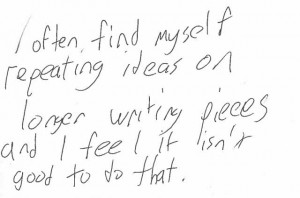This edition of Tuesday’s Tips is brought to us by Dr. Ryan Shirey, the Director of the WFU Writing Center.
One concern that students often have is that they are repeating themselves, either in word or idea, over the course of an essay. While repetition is not an inherently bad thing (and can quite often be used to great effect as in the classical rhetorical technique of anaphora or this old classic by The Fall), most of us want to make sure that we’re not boring our readers by saying the same things over and over again without any variation or development.
If you are concerned that you might be getting a little too repetitive in your writing, you might try the following steps to identify and revise potentially repetitive portions of your text.
1) If you’re worried about repeating ideas, then one of the easiest and most illuminating things that you can do is to reverse outline your draft. When you reverse outline, you take your draft and distill each idea and piece of evidence back into an outline. Some writers like to do this in the margins and others prefer a separate sheet of paper. Whatever your preference, a reverse outline will let you see rather clearly whether or not you’ve returned to the same idea or piece of evidence multiple times in the same essay. If you find that you have, you can think about rearranging or cutting paragraphs as necessary.
2) Another strategy if you’re worried about repeating ideas is to use different colored highlighters, colored pencils, or coloring tools in a word processing program to mark areas of your text where you’re working on specific ideas. If I’m writing a paper on the history of the run up to World War I, for example, I might decide to mark all the areas where I discuss treaty arrangements in green, all the areas where I discuss colonial expansion in blue, the parts that discuss arms manufacturing and trade in red, the areas that take on nationalism in yellow, and so on. Once I’ve visualized these ideas with color, I can see more easily whether or not I keep returning to the same topics or whether I need to restructure any portions of my essay. Be careful, though–you don’t want to create artificial distinctions that might negatively impact your overall point. For instance, if a conflict over colonial expansion leads to a treaty arrangement, I would need to be very careful about using the context in which I’m discussing that treaty dictate how I code that sentence or paragraph.
3) If you are worried about repeating ideas because you have run out of things to write about, perhaps your best bet is to look for ways to open your text back up for discussion with questions. You might ask someone you trust to be critical to read your work with a skeptical eye and ask you any questions that arise. You can even play that role yourself and think of any possible counterarguments that a reader might make, even if you don’t find those arguments particularly persuasive yourself. Entertaining a different perspective and reframing your point might allow you to fill out your essay without repeating the same or similar points ad nauseam. One great way to get this kind of perspective is to (shameless plug) visit the WFU Writing Center!
4) If you’re worried about repeating words or phrases, you can use the “find” feature in your word processing program to highlight all of the instances where you’ve used it. Once you’ve identified the problem areas, you can look for ways to combine sentences using coordination or subordination, replace nouns with pronouns, or (very carefully) use a thesaurus to diversify your vocabulary. The first step here is developing enough of an ear to “hear” the repetition and then to make that repetition visible so that it can be addressed. One way that I’ve found particularly effective is to read my work aloud or even to record myself reading and to listen as if I were an audience member. Nothing will help you recognize word and phrase repetition like having to say the words on the page out loud–one of the many reasons why we take this very step in the Writing Center.
